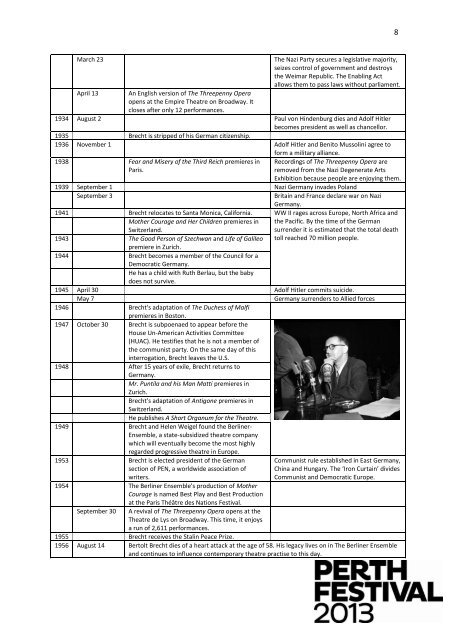THE THREEPENNY OPERA
THE THREEPENNY OPERA
THE THREEPENNY OPERA
You also want an ePaper? Increase the reach of your titles
YUMPU automatically turns print PDFs into web optimized ePapers that Google loves.
March 23 The Nazi Party secures a legislative majority,<br />
seizes control of government and destroys<br />
the Weimar Republic. The Enabling Act<br />
allows them to pass laws without parliament.<br />
April 13 An English version of The Threepenny Opera<br />
opens at the Empire Theatre on Broadway. It<br />
closes after only 12 performances.<br />
1934 August 2 Paul von Hindenburg dies and Adolf Hitler<br />
becomes president as well as chancellor.<br />
1935 Brecht is stripped of his German citizenship.<br />
1936 November 1 Adolf Hitler and Benito Mussolini agree to<br />
form a military alliance.<br />
1938 Fear and Misery of the Third Reich premieres in<br />
Paris.<br />
8<br />
Recordings of The Threepenny Opera are<br />
removed from the Nazi Degenerate Arts<br />
Exhibition because people are enjoying them.<br />
1939 September 1 Nazi Germany invades Poland<br />
September 3 Britain and France declare war on Nazi<br />
Germany.<br />
1941 Brecht relocates to Santa Monica, California. WW II rages across Europe, North Africa and<br />
Mother Courage and Her Children premieres in the Pacific. By the time of the German<br />
Switzerland.<br />
surrender it is estimated that the total death<br />
1943 The Good Person of Szechwan and Life of Galileo<br />
premiere in Zurich.<br />
toll reached 70 million people.<br />
1944 Brecht becomes a member of the Council for a<br />
Democratic Germany.<br />
He has a child with Ruth Berlau, but the baby<br />
does not survive.<br />
1945 April 30 Adolf Hitler commits suicide.<br />
May 7 Germany surrenders to Allied forces<br />
1946 Brecht's adaptation of The Duchess of Malfi<br />
premieres in Boston.<br />
1947 October 30 Brecht is subpoenaed to appear before the<br />
House Un-American Activities Committee<br />
(HUAC). He testifies that he is not a member of<br />
the communist party. On the same day of this<br />
interrogation, Brecht leaves the U.S.<br />
1948 After 15 years of exile, Brecht returns to<br />
Germany.<br />
Mr. Puntila and his Man Matti premieres in<br />
Zurich.<br />
Brecht's adaptation of Antigone premieres in<br />
Switzerland.<br />
He publishes A Short Organum for the Theatre.<br />
1949 Brecht and Helen Weigel found the Berliner-<br />
Ensemble, a state-subsidized theatre company<br />
which will eventually become the most highly<br />
regarded progressive theatre in Europe.<br />
1953 Brecht is elected president of the German<br />
section of PEN, a worldwide association of<br />
writers.<br />
Communist rule established in East Germany,<br />
China and Hungary. The ‘Iron Curtain’ divides<br />
Communist and Democratic Europe.<br />
1954 The Berliner Ensemble's production of Mother<br />
Courage is named Best Play and Best Production<br />
at the Paris Théâtre des Nations Festival.<br />
September 30 A revival of The Threepenny Opera opens at the<br />
Theatre de Lys on Broadway. This time, it enjoys<br />
a run of 2,611 performances.<br />
1955 Brecht receives the Stalin Peace Prize.<br />
1956 August 14 Bertolt Brecht dies of a heart attack at the age of 58. His legacy lives on in The Berliner Ensemble<br />
and continues to influence contemporary theatre practise to this day.


